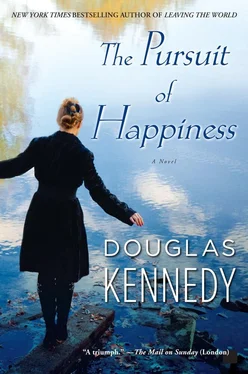A week later, I checked out of my hotel on the rue de Sevres and moved into a small atelier on rue Cassette in the Sixth. I lived there for the next four years. Initially I took French lessons and squandered the days in cinemas and brasseries. Then I found a job in a small Franco-American advertising agency on the Champs-Elysees. Through colleagues at work, I was parachuted into the center of Paris's burgeoning American community - for this was the time when the weakness of the franc, the luxury of the GI bill, and the ongoing witch hunt back home meant that the French capital was heaving with expats. Initially, I resisted mingling with my compatriots. Inevitably, though, I found myself getting more and more tangled in the American community. Especially after I met Mort Goodman - the executive editor of the Paris Herald-Tribune - at a party.
'I'm sure I know your name from somewhere', he said after we were introduced.
'Did you ever work in New York?' I asked.
'Sure', he said. 'I was with Collier's for three years before getting the job over here'.
'Well, I used to write a bit for Saturday/Sunday'.
'Oh hell, you're that Sara Smythe', he said, then insisted on taking me out to lunch the next day. By the end of that lunch, he offered me the chance to contribute the occasional feature to the paper. I kept on churning out copy for the advertising agency, but started having my by-line appear every few weeks in the Herald-Tribune. Three months after I started getting published in that paper, Mort Goodman took me out for another lunch and asked if I'd like to try my hand at a column.
'Traditionally, we've always had a resident American-in-Paris write a weekly piece on life in the capital, local color, la mode du moment... whatever. Now the guy who's been doing it for the past two years has just got himself fired for missing four deadlines in a row, due to his little love affair with the bottle. Which means the position is open. Interested?'
Of course, I said yes. My first column appeared on November seventh, 1952... three days after Eisenhower beat Stevenson for the presidency. That election - and McCarthy's accelerating hearings in Washington - hardened my conviction that the best place for me at the moment was right here in Paris. And I liked the place. No, I wasn't one of those dumb romantics who swooned every time I smelled the aroma of a freshly baked baguette in my local boulangerie. Paris to me was a complex, contradictory entity - simultaneously rude and gracious, erudite and banal. Like anyone interesting, it was deeply contradictory. Its epic grandeur - its sense of self-importance - meant that Paris saw itself as a unique entity within which you, the resident, were privileged to dwell. In this sense, it reminded me of New York, as it was totally indifferent to its citizenry. The Americans I met who hated Paris - and railed against its arrogance - were usually people from smaller, more intimate cities like Boston or San Francisco, where the local beau monde stroked each other's ego, and anyone in a position of power or authority felt as if they counted. Parisian arrogance meant that nobody was important, nobody counted. It's what I loved most about the city. As an expat, you didn't try to be ambitious in Paris. You tried to live well. You always felt as if you were an outsider... but, after everything that had happened in New York, I embraced that etranger role with relief.
And Paris, in turn, embraced me. The column gave me a profile there. But so too, I discovered, did the circumstances surrounding my expatriatism. I never mentioned anything about my brother. Much to my surprise, however, many members of the American community knew about Eric's death, just as they had also heard how I'd been dropped from Saturday/Sunday. I avoided talking about such matters - because I didn't like the idea of using the blacklist as a form of social currency... and also because, according to Smythe family values, there was something deeply gauche about seeking sympathy for any personal misfortune. But I still found myself being made a member of an eclectic, raffish community. Having lived a rather singular life in New York (and having never been the most gregarious of people), it was liberating to find myself now plunged into something of a social whirl. I was out on the town at least five nights a week. I drank with the likes of Irwin Shaw and James Baldwin and Richard Wright and many of the other American writers who were living in Paris. I heard Boris Vian sing songs in some St Germain cave, and actually attended a reading given by Camus at a St Germain bookshop. I became a habitue of late-night jazz haunts. I indulged in long lunches with friends at Le Balzar (my favorite brasserie). I developed a taste for Ricard and casual affairs. Paris treated me well.
I was kept in regular contact with things New York, courtesy of Joel Eberts. We wrote each other once a week - generally to discuss financial matters (when it became clear that I was going to be staying in Paris for a while, he found someone to sublet my apartment), and also for Joel to forward any mail that came my way.
In June of 1953, his weekly update ended with the following paragraph:
There is only one personal letter in the batch of mail I'm enclosing this week. I know who it's from - because it was hand-delivered to me by its author: Meg Malone. She waltzed in here a few days ago, unannounced, insisting I tell her where she could find you. All I said was that you had left the country. Then she handed me the enclosed envelope, and insisted that I forward it to you. I told her what I told her brother: that you had specifically requested that any mail from Jack be held by me. 'I'm not Jack', she countered - and lawyer that I am, I had to concede she had an argument there. She said nothing else - except that, if I didn't forward the letter, I'd be her sworn enemy for life. The fact that she said this with a smile made me like her... and also made me honor her request. So here's the letter. Read it if you wish. Throw it away if you don't want to. The choice is your own.
Timing is everything in life. This letter arrived at the wrong moment. It was the night after the Rosenbergs had been executed at Sing-Sing for allegedly selling atomic bomb secrets to the Soviets. Like just about every American I knew in Paris (even those who usually voted Republican), I was horrified by this despotic act - and one which, yet again, made me despise the forces which had destroyed my brother. For the first time in my life, I had actually done something vaguely political - attending a candlelight vigil in front of our Embassy (along with around three thousand Parisians, led by notables like Sartre and de Beauvoir), signing a petition condemning this act of state murder, and feeling completely ineffectual and furious when the word came through (around two that morning, Paris time) that the executions had gone ahead. The next day, Meg Malone's letter arrived courtesy of Joel. My first thought was: tear it up... I don't need to hear any apologias for Jack Malone. Instead, I ripped open the envelope and read:
Dear Sara,
I don't know where you are, or what you're thinking. But I do know that Jack loves you more than anything, and has been in something approaching constant agony since you disappeared. He told me everything that happened. I was horrified by what he had done. I can fully understand your grief and fury. But... yes, here comes the but... he is as much a victim of the insanity that has gripped our country as your brother. This is not to condone his choice, or to excuse an action which many would interpret as self-serving. Faced with an appalling choice, he panicked. In doing so, he knows he killed your love for him. He has been trying to make contact with you for nearly a year, but has failed. Your lawyer informed him that you were refusing to read his letters. Once again, I cannot blame you for feeling that way. And, believe me, the only reason I am writing to you now is because Jack is currently suffering from something akin to a nervous breakdown - which is related entirely to the overwhelming guilt he feels about naming your brother and losing you.
Читать дальше












